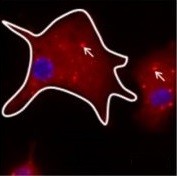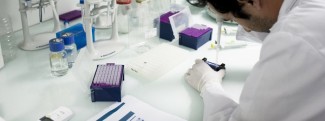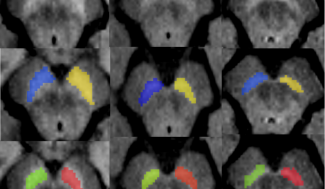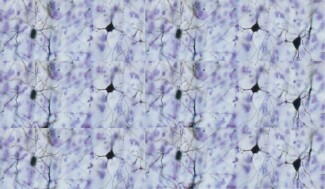Family forms of Parkinson's disease
Familial forms of Parkinson’s disease account for around 5% of all cases. They are known as monogenic and are hereditary.
To date, 13 genes have been identified as carrying disease-causing mutations.
Transmission of these genes may be dominant, in which case a child born to a parent with Parkinson’s disease and therefore carrying the genetic mutation will have a 50% risk of developing the disease.
The SNCA gene provides the instructions for α-synuclein, the protein component of protein clusters observed in dopaminergic neurons during disease.
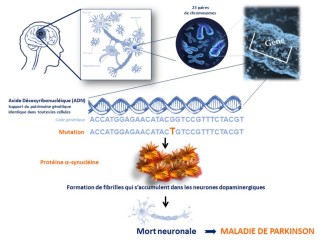
Genetic factors in Parkinson’s disease
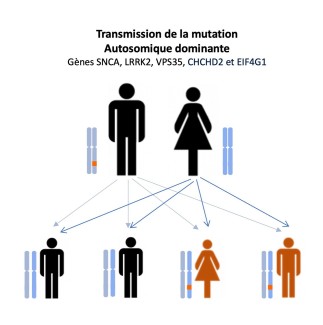
The LRRK2 and VPS35 genes provide the instructions for proteins with multiple cell functions, particularly neurons.
Transcription factors are encoded by the CHCHD2 and EIF4G1 genes, which are involved in rare cases.
Transmission can also be recessive, in which case a child born to two healthy parent carriers of the mutation will have a 25% risk of developing the disease.
These genes are largely responsible for early onset forms of Parkinson’s disease developing in young people.
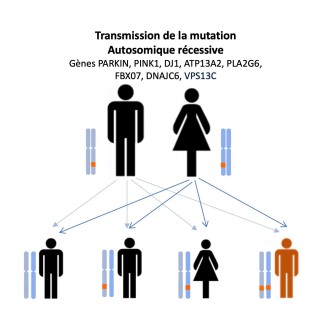
The PARKIN, PINK1, DJ1 and FBX07, ATP13A2 and VPS13C genes are involved in the functions of the mitochondria, an organelle with the role of supplying the energy needed for the cell to function normally.
DNAJC6 genes play an essential role in synaptic transmission, allowing communication between the neurons.
The PLA2G6 gene is involved in the regulation of intracellular iron.
At Paris Brain Institute
Researchers from the team of Olga CORTI, INSERM researcher and Professor Jean-Christophe CORVOL, neurologist (AP-HP and Sorbonne University) carry research projects on mutated genes involved in Parkinson’s disease. Suzanne LESAGE’s work in 2016 led to the identification of recessive transmission mutations in the VSP13C gene that cause early and severe forms of Parkinson’s disease. This work has also highlighted the role of these mutations in mitochondrial dysfunction.
Researchers on the team of Olga Corti, an INSERM researcher, and Professor Jean-Christophe Corvol, a neurologist (AP-HP and Sorbonne University), are working on projects researching mutated genes involved in Parkinson’s disease. Work by Suzanne Lesage in 2016 identified recessive transmission mutations in the VSP13C gene that causes early onset and severe forms of Parkinson’s disease. This work also demonstrated the role of these mutations in mitochondrial dysfunction.
Sporadic cases of Parkinson's disease
In 95% of cases, the disease occurs in a person who is not carrying mutations in the genes involved in the hereditary forms. Parkinson’s disease is known to be multifactorial, meaning that it occurs in genetically predisposed people after exposure to one or more environmental factors.
For several years, several environmental and genetic factors have been identified as increasing or decreasing the risk of developing Parkinson’s disease.
While studies have found that tobacco and caffeine seem to be protective factors against developing the disease, pesticides, diabetes, body mass index and cholesterol have not been definitively linked to an increased risk of developing the disease, despite a great deal of research.
A link between depression and Parkinson’s disease has been detected, but it is still difficult to determine the precise nature of this connection. Is depression an early warning sign for Parkinson’s disease, or do the two diseases share a common origin?

At Paris Brain Institute
From a genetic perspective, a very recent study of systematic screening of the human genome, in which the team of Olga Corti, INSERM researcher, and Professor Jean-Christophe Corvol, neurologist (AP-HP and Sorbonne University), was involved, conducted on a population of 37,688 patients and 1.4 million controls identified 90 polymorphisms associated with an increased risk of developing the disease. A majority of these polymorphisms may have an influence on the genes involved in brain function.

